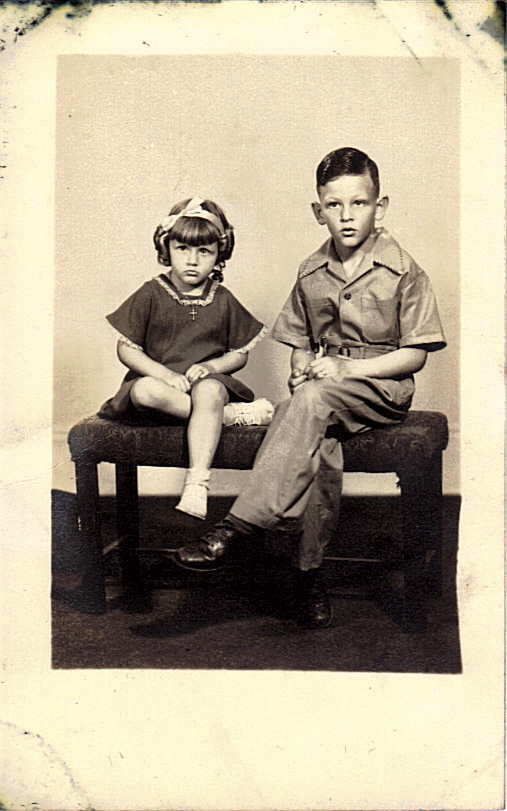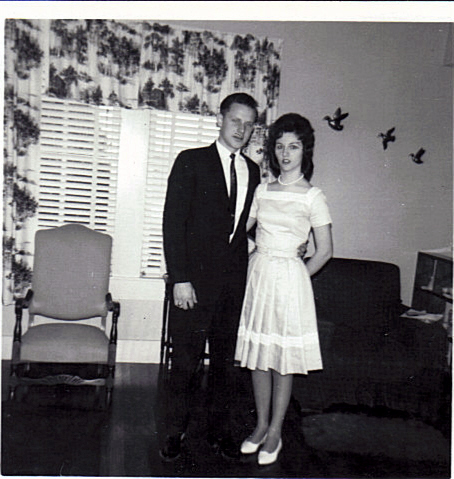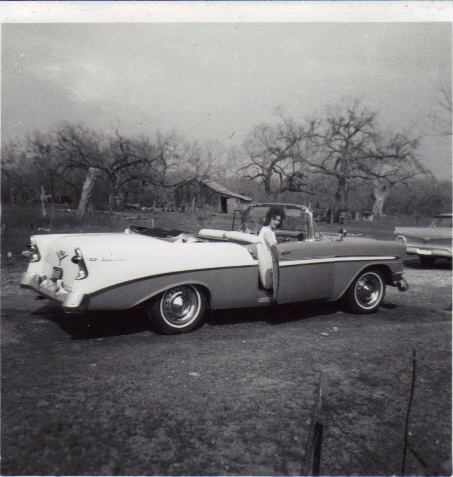TRANSCRIPTION
What are your earliest childhood memories?
I don't think I remember anything before school started in the first grade. I remember the nuns and the bad kids getting yelled at by the nuns. One of them had a ruler and would hit you on the butt.
Did you ever get hit with the ruler?
Oh, no! I was a good little girl!
How was school set up back then?
Well, at St. Hedwig (the Annunciation of the Blessed Virgin Mary Catholic School she attended) first and second grade would be set up in a room about the size of this one (10' x 10'). Then, third, fourth, and fifth would be together. And then sixth, seventh and eighth grade would be together in another room.
When and where were you born?
I was born on August 14, 1944 in a hospital in San Antonio. I don't know which hospital, though.
When was Clarence (brother) born?
He's older, 1944.

What kind of toys did you play with?
I didn't have many. We made a bunch of our toys out of stuff like thread spools that we found. I had one doll; I think it was a hand-me down. Sometimes me and Clarence played outside together.
Did you have chores you had to do?
No, not really. I didn't have any set chores that I had to do. I just helped around the house if my parents needed it. I never really had to work around the house.
What did you and your friends do for fun?
Ohh! When the Riedel Brothers play at the dances at St. Hedwig, a group of four or five of us girls would go! We'd sit around and look at the boys. It was the highlight of the month! We'd only go out about two times a month.
Did your school host school dances?
No.
How many did you have in your graduating class?
50.
Was there racism in school?
I went to a Catholic school so there weren't any blacks there. I remember black only bathrooms. There were only two or three blacks in this area. One was Flinky. Another was Neely. He'd walk places and people who knew him would give him a ride.
How was dating when you were younger?
I got to date whoever I wanted, but not until I was sixteen. We usually went to the drive-ins. That was real big back then.

How much did it cost?
I don't know? The guy always paid. That's a good question.
Were your parents strict?
No, not really. During lent they were though! I used to get so mad because I couldn't go to the dances during lent and it was always someone good playing too! They were really into the church and strict with religion.
Were you really close to your parents and brother?
Pretty close. Back then, I never really thought about it like that.
Did you have any family members in the military?
I had two cousins that died in World War II. I don't really remember them because I was so young when they left.
Did you attend family events?
The holidays like Easter and Christmas. Oh, and the kid's birthdays were really big. The family would always get together. We'd have homemade ice cream, the men would sit back and drink and the women would gossip. (Pauses a few moments) It's weird. You don't really remember things until someone asks you about them and you see flashes in your mind.
Was there one big birthday in particular that stood out?
Not really. We didn't do a whole lot for them. It was just another day. I don't know if everyone lived like that or just us. It's not like now day how ya'll are always with friends. We never spent the night at each other's houses. Except one cousin, Lillian. In the summer we would sometime stay with each other.
Did you have air conditioning in your house?
No and there's still none in that house. We had no TV until eighth grade, but we did have a radio. We'd listen to different shows at certain parts of the day. We'd always listen to the series "Lone Ranger". Aunt Virgie got a TV before us. So, on Sundays, after lunch, we'd watch the Lone Ranger with Roy Rogers and Dale Evans. I think it was just western series that went on. Oh, the parades were a big deal to me. For the Battle of Flowers Parade we'd go to Bernice's house (cousin) and watch it.
Where did you learn to cook?
I guess watching Grandma (her mother). She always had meals ready and it was time to eat. She had dinner sitting on the table ready to eat. That's how I always did it, too. I had the meals ready on the table when it was time to eat.

What kind of music did you listen to?
Country. We were old, country people. (Laughs) It was the really old type like Hank Williams.
How'd you feel about Elvis?
He was great! (Smiling big) Oh, man! He was just a heart throb! He could sing and wiggle and everything else it took! (Laughs) When he dies, Shirley Aniol called and told me.
Did you have any dreams as a young girl?
(Thinks) You know, I can't remember if I did or not.
What was your first paying job?
It was for Kemper Insurance Company in the Majestic building downtown. Grandpa (her father) would drive me to the bus stop on Rigsby and I'd ride the city bus there every day right up until your mother was born. All moms always stayed home once they had kids, not like now. Oh! One time, right after John Kennedy was elected, he drove down Houston Street in his car and we all got to go to the window at work and see him and Jackie. That was a big deal. I thought he was it. I liked him. He was fresh and new, not like all the other old presidents.
When did you get your driver's license?
After your mom was born in the spring of '65. I took driving lessons. It was ok. I remember I had a real neat teacher. We got a brand new car after your mom was born. It was a '64 Chevy and maroon. It was pretty.

How did you and Peepaw (my grandpa) meet?
We met in school and graduated together. I never dated anyone from my school until him. It was never anything real serious with other boys that I went quite a bit with to the drive-ins. One of our (my grandfather and her) was our Junior/Senior Prom in April of 1962. We graduated, got married on May 4, 1963, and waited a year later to have our first baby (Laura, my mom, born June 24, 1964). Then, in '66 we had Ronnie. A lot of people got married right out of high-school, but we waited a little bit. Then we had Lisa later on April 8, 1964.

How were their birthday parties?
Ordinary birthday parties every year at the house with all the little kids. We had the, in the garage. That's where most people had them.
If you could have any job what would it be?
An airline stewardess. I would love it! It looks like so much fun! You'd get to go a lot of places. Of course the planes aren't like they are now. I remember one time we were on a plane and it was just everywhere. They were all like that then.
(Remembering) Oh! Twice a year there'd be church picnics. We'd go and spend the day there. We'd sit around and look at the boys. (Laughs) The fish pond was a big deal. You know where you put the string over the wall and they'd attach a toy and you'd yank it back. On other Sundays, we didn't have a TV so we'd visit. No one does that anymore. Almost every Sunday we'd go to someone's house or they'd come to ours. (Laughs) I had a dull life, I didn't live much. (Laughs again).
Is there anything you'd like to add?
No.

